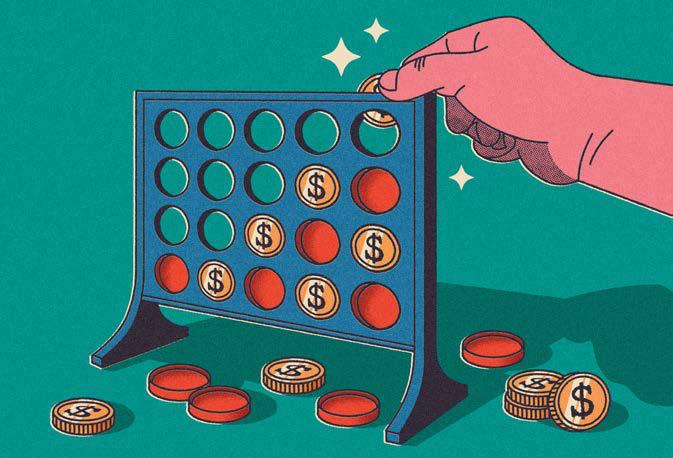Denemek ALTIN - Özgür
Where to Stash Your Investments
Kiplinger's Personal Finance
|September 2022
Use our guide to decide which assets belong in a taxable account and which go into a tax-advantaged account.

WHICH INVESTMENTS YOU HOLD matters (and in what proportions), but so, too, does where you hold them, whether it's in a tax-advantaged account or a taxable one. A recent lawsuit against Vanguard Group reveals how important such a decision can be.
Earlier this year, three investors sued Vanguard for negligence and breach of fiduciary duty after the investment company's target-date funds made a substantial capital gains distribution in late 2021, generating an unexpected tax bill for the plaintiffs (and other Vanguard investors). (Mutual funds are required to pass on any realized net gains to fund shareholders at least once a year.) But if the investors had held those mutual fund shares in tax-sheltered accounts instead of in taxable ones, the unwelcome tax bill could have been avoided.
Just as taxable and tax-advantaged investment accounts get different tax treatment, so do certain types of investment income. The strategy of divvying up your assets into certain types of accounts to lower your tax bill is called asset location. The general advice is to hold less-tax-efficient investments in tax-sheltered or tax-free accounts, such as an IRA, an employer-sponsored 401(k) or a Roth version of either, and to put tax-efficient assets in a taxable account.
Of course, much may depend on how much money you have, your time frame and cash needs, and whether you're a buy-and-hold investor or an active trader, among other things. Tax considerations shouldn't drive every decision, says Boston, Mass., certified financial planner Jay Karamourtopoulus, but ultimately, "a well thought out asset location plan can reap many benefits and should be addressed." Below, we tackle the strategy with a long-term view and break down which investment assets are best, generally speaking, for tax-deferred accounts, tax-free ones and, of course, taxable accounts. Tax rules guide the advice, which we'll get into in each section.
Bu hikaye Kiplinger's Personal Finance dergisinin September 2022 baskısından alınmıştır.
Binlerce özenle seçilmiş premium hikayeye ve 9.000'den fazla dergi ve gazeteye erişmek için Magzter GOLD'a abone olun.
Zaten abone misiniz? Oturum aç
Kiplinger's Personal Finance'den DAHA FAZLA HİKAYE

Kiplinger's Personal Finance
A TAX BREAK FOR MEDICAL EXPENSES
The editor of The Kiplinger Tax Letter responds to readers asking about health care write-offs.
2 mins
February 2026

Kiplinger's Personal Finance
Volunteering to Help Others at Tax Time
Through an IRS program, qualifying individuals can get free assistance with their tax returns.
2 mins
February 2026

Kiplinger's Personal Finance
CATCH-UP SAVERS FACE A TAXING 401(K) CHANGE
Under new rules, you may lose an up-front deduction but gain tax-free income once you retire.
2 mins
February 2026

Kiplinger's Personal Finance
The Case for Emerging Markets
Economic growth, earnings acceleration and bargain prices favor EM stocks.
3 mins
February 2026

Kiplinger's Personal Finance
THE NEW RULES OF RETIREMENT
Popular guidelines about how to save, invest and spend need to be updated and personalized to ensure you'll never run out of money.
15 mins
February 2026

Kiplinger's Personal Finance
Smart Ways to Share a Credit Card
Adding an authorized user has its benefits, but make sure you set the ground rules.
2 mins
February 2026
Kiplinger's Personal Finance
THE BEST AFFORDABLE FITNESS TRACKERS
These devices monitor your exercise, sleep patterns and more- and they don't cost an arm and a leg.
4 mins
February 2026
Kiplinger's Personal Finance
A VALUE FOCUS CLIPS RETURNS
THERE'S more to Mairs & Power Growth than its name implies. The managers favor firms with above-average earnings growth. But a durable, competitive position in their market- “a number-one or number-two position and gaining share,” says comanager Andrew Adams—and a reasonable stock price matter even more.
1 mins
February 2026

Kiplinger's Personal Finance
Look Beyond the Tech Giants
I am hooked on a podcast called Acquired, in which two smart guys do a deep analytical dive, typically lasting three or four hours, on a single successful company such as Coca-Cola or Trader Joe's. Ben Gilbert and David Rosenthal, a pair of venture capitalists, are especially adept at explaining what's behind the success of such tech giants as Alphabet (symbol GOOGL, $320), the former Google, which recently merited 11 hours and 42 minutes of dialogue all by itself.
4 mins
February 2026

Kiplinger's Personal Finance
How to Pay for Long-Term Care
A couple of months ago, I wrote that many Americans significantly underestimate how long they could live in retirement (see “Living in Retirement,” Dec.). With the possibility of a 30-year retirement becoming more common, retirees need to plan for so-called longevity risk to make sure their assets last a lifetime. And the longer you live, the more likely you'll need to pay for some form of long-term care. That can range from assistance with activities of daily living to in-home care to a nursing home stay.
2 mins
February 2026
Translate
Change font size

